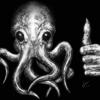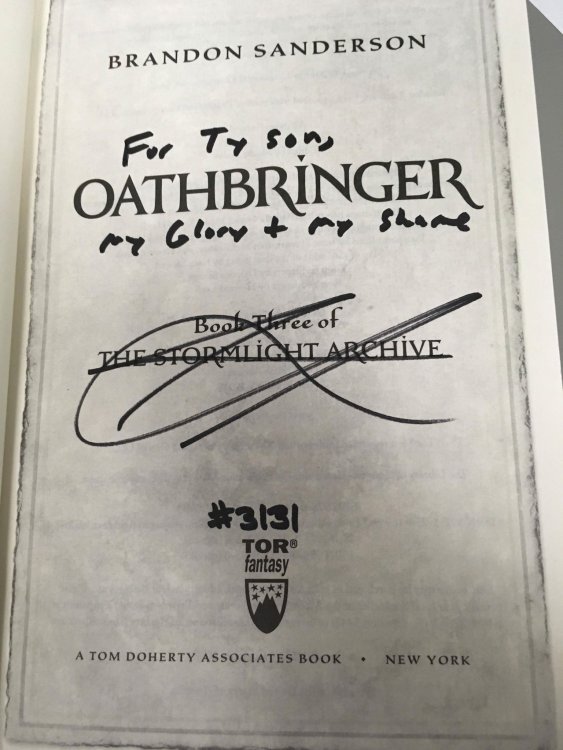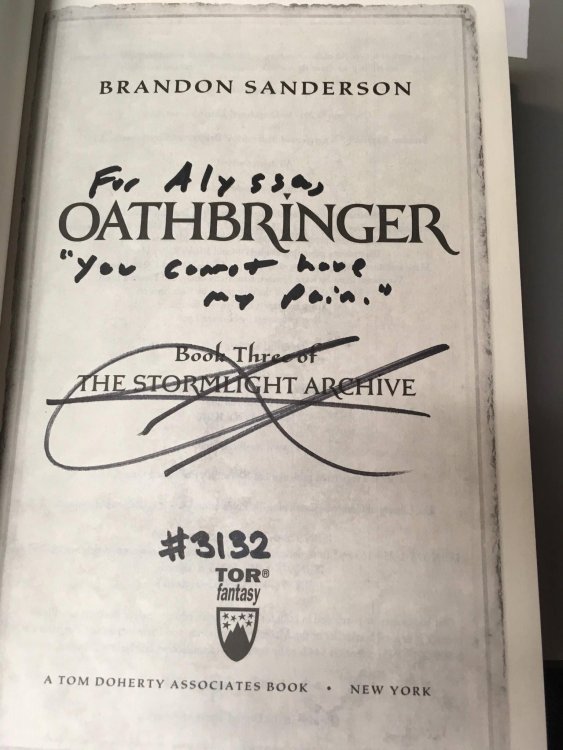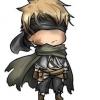Search the Community
Showing results for tags 'oaths'.
-
So I dunno I was just thinking about it because it's been bothering me. It was a really nice curveball from Brandon, because we all kind of assumed he was going to say it. Then he didn't. I think we have enough information on screen to eek out the fourth ideal. I don't think it's about protecting. I think it's about killing. "I can't lose him, but.....oh, Almighty...I can't save him." "I will kill the ones that......" or "I will kill those who endanger humanity" or even like Szeth "I will lead for Dalinar Kholin" - If he said that and he is sure Dalinar is about to turn the dial up to evil 11, he just can't do it. He couldn't say the words because he knew if he did he would presumably have to kill Dalinar, and he couldn't do it. In part one Kaladin and Syl have a conversation about morality and who is right and who is wrong. The Fourth Ideal I believe for windrunners has to do with choosing a side. Just like Szeth's third ideal. Kaladin can't choose. Just like the windrunner crystal. They first 3 ideals have to do with protecting, and they have to know all the parshendi aren't bad.
-
So, just got back from the release! So hype! But, to the point. I got two books, one for me and one for a friend, and I asked for new oaths we haven't heard yet. "My Glory and my Shame" - this one seems strange, could just be a nice quote. "You cannot have my pain" - possibly seems more legit. There was a ton of people, and it was late, so maybe these aren't what I asked for, but maybe. just something cool I guess.
- 29 replies
-
2
-
This might be a pointless thread, but it's something that struck me as weird. The Coppermind and the Stormlight Archive refer to Ym as a likely Truthwatcher. Considering the fact that he gave children shoes in exchange for their stories. That seems to be more in line with the Edgedancers oath to "remember those who have been forgotten." I don't remember him doing anything that resembled casting illusions like you would expect with Lightweaving.
- 37 replies
-
1
-
- ym
- surgebinding
-
(and 1 more)
Tagged with:
-
I've seen dozens of topics on 'when' the Recreance happened, 'what' the secret is that broke the KR, 'why' they abandoned their shards en masse, and 'who' may or may not have taken part in the Recreance. This is not one of those topics. Right now I want to discuss 'how'. @The One Who Connects recently reminded me that abandoning oaths leads to a slower spren death/regression, while breaking oaths can straight up kill them. It seems that the Recreance happened rather suddenly, and we're told that multiple orders took part all at once. That, to me, screams of purposefully breaking an oath. It's possible that each order chose a different ideal to break, but more likely... which oath could all the Radiants break at once? Only the first. Life before death. Obviously the Radiants betrayed this oath when they killed so many sprenblades, but how do you break this oath to bring that about in the first place? I don't think this is a likely candidate for the broken oath. It felt more like the Radiants had a collective (probably very convincing) reason to abandon their posts, and I doubt they just did it in order to give up and die... at least they wouldn't have chosen to do that all at once. Strength before weakness. Similarly, if their weaknesses caused them to perform the Recreance, I feel like it would be more gradual, with only a few Radiants falling at a time. Again, I feel that - if they had a good reason for the Recreance - seeing it through and betraying their spren would take massive strength. Journey before destination. This seems most likely to me. If the Radiants discovered a 'secret' that broke them, it could be any one of the things that numerous other threads have discussed (again, don't derail my thread!) Regardless, I think it's safe to say that if the Radiants decided the Recreance was the only way to save humanity (or really any other very convincing end goal), then they would heroically go through with it despite the cost. While noble in theory, that attitude is wilfully putting destination before journey. I think making that choice is what allowed the Radiants to leave their shards as they did. I obviously have a lot of assumptions here Anyone have another idea on 'how' the Radiants were able to perform the Recreance as they did?
-

[OB] On Shallan's possible character progression - and why Adolin is hindering it
Guest posted a topic in Stormlight Archive
This is a theory, that I've been forming in the current Shalladin thread here yesterday. Well, the thread moved on and never really got into any discussion about it. I believe the theory alone is enough to allow for a whole thread. I don't want this thread to become part of the shipping war. I want to see opinions about this. So, please refrain from getting too worked up about any of it. It's just a theory. (And I know, that I have problems with not getting worked up, too. I try to work on it. ) ---- So, in Chapter 15 of Oathbringer we see Shallan getting confronted by Adolin with the fact, that she actually has a Shardblade, a fact she has been trying to forget by splitting Pattern into two personalities - the spren and the Blade. Now, I'm a pretty vocal fan of the Shallan/Kaladin pairing, so this might seem a bit biased, but I hope you try to understand my perspective, when I try to explain the Shallan/Adolin relationship in it's current form - from Shallan's perspective - Adolin's is pretty short, he is infatuated with her, maybe even in love, and wants to keep her. But I digress, Shallan's perspective: The world is ending, listeners all around Roshar are turning into mindless murder machines threatening mankind. And damnation, Shallan is supposed to be a Radiant. To step up and help save mankind? Imagine the pressure. Imagine the uncertainty. Adolin is the only thing, that currently is certain in Shallan's life. She clings to it, she bends herself to make it work, like when she wouldn't tell Adolin, that she rather would not train duelling stances. That is also why her subconscious starts to kick in and panicks, when she gets the feeling, he might blow off the betrothal. But only the betrothal, she's so focused on the betrothal, of that anchor, that she is afraid of losing that. But I don't blame her, it's human. It is true, that she likes Adolin, but in my opinion, there is little true textual evidence, that she loves him. She never says, "Oh no, Adolin is going to leave me.", but, instead, says "Oh no, he's going to blow off the betrothal." Now, how does Adolin inhibit Shallan's character growth? By being that one anchor in her life, she is too afraid to lose it. So, in order to not disappoint him, she creates Brightness Radiant, just so she can have a good time with him. It would be fine, but it is not what she has to do to progress. Pattern basically confirms that. Shallan needs to become a Knight, but she needs to be it herself. Not Brightness Radiant. Not Veil. It needs to be Shallan. As seen above, when Shallan denies the fact, that she can be a Knight Radiant, Pattern is confused. Or, at least, Shallan recognizes it as confusion. Maybe it is irritation. Anyway, I don't believe, that Pattern can help her with this. He blames himself for her state of mind and even offers to kill himself for Shallan. So she can become, who she needs to be. He thinks, that she hates him. Even if Shallan tells him, she doesn't. He is confused, because he is oblivious to the fact, that Shallan, in her mind, has been splitting Pattern in two. I really is a strange relationship Shallan has been creating for them after the hard truth at the end of WoR. One might argue, that Brightness Radiant is just a role, like an actor would play, but I don't agree with that. She is a different personality, which takes over. A facade. A Shallan-influenced, but different soul. The biggest takeaway for that is, that Brightness Radiant apparently can't draw, one of Shallan's best skills. She's even talking of Radiant as a different person. Anyway, the bottom line is, that Shallan is already building walls again. And, though not through his intent, Adolin is enabling it. The worst part is, that he doesn't even see the change in Shallan, when she takes on the Brightness Radiant persona. I have seen some arguments about Shallan being able to overcome her fear of Pattern, by Adolin's love of Blades rubbing off on her. Could be, the problem is, that it currently is rubbing off on Radiant, who is a completely different entity from Shallan. Even in Shallan's own mind! I can't emphasize that enough. Poor Adolin doesn't know it, but he's doing her a disservice. And now he thinks, that she enjoys Shardblade practice, so I am positive, that it will become a regular thing. And everytime he won't be with Shallan, but with Radiant. Then I've been thinking: "What could help her then? If her own betrothed can't help her, because of their convolution in being betrothed in the first place?" And then it hit me: Kaladin. In the end, it always comes down to Kaladin. Why? I'll tell you. Remember after Kaladin killed that Veden Shardbearer (I won't call him Helaran here, because I'm still not 100 percent convinced it really is him. The description was suspiciously vague.), who killed his men? He refused the shards. He said, that he can't bear them, that he won't bear them. For one, because they were coated with the blood of his own men. See the parallel to Pattern being tainted by Shallan's mother's blood? And, secondly, because it would make him a lighteyes. Remember how Adolin offers Kaladin Shards after the duel? He still refuses. He still can't imagine ever carrying a Shardblade. He fears them for their killing power, he disrespects them for that. But he overcame his problems. He saw, that he needed to be a Knight Radiant, to wield a Shardblade and, if necessary, even become lighteyed in the process. Become one of those persons, that he hated for all his life. What I think is, that Shallan doesn't need someone, who tells her how great Blades are and that she should be happy for having one. She needs someone, who she can relate to. Who understands her problem. Someone, who says, "I know how you feel, I felt the same not so long ago. I hated the idea of wielding a Shardblade. But let me help you get over that fear. Let me help you become what you have to become. You don't have to do this all by yourself, you're not alone." And that someone is Kaladin. Because, if you break it down to bottom, they both have or had the same problem. The unability to use a Shardblade as a weapon. Hating them for their killing power. Plus it would give a wonderful opportunity to finally talk about Helaran. Kaladin also seems to be pretty good at noticing, when she's hiding herself again. Like he did in the carriage ride in WoR, where she was hiding some emotions from Adolin. Conclusion: Shallan is barricading herself in lies again. Pattern blames himself for it. Adolin is involuntarily enabling her. Kaladin might be the solution.- 82 replies
-
This is a longer post than I intended. I foolishly read the thread about Taravangian after writing the first part of this post. That thread in turn led to the discussion of oath interpretation and Knight Radiant behavior. Advance apologies for lumping all that together here, but I think they are related issues. Radiantspren “True” Names I theorize each Radiantspren is the personification of the human ideal represented by their KR Order’s “Primary Attribute.” IMO, these ideals are the spren’s true names, reflecting what they are. The names in the novels are the names Radiantspren call themselves. These self-identifying names may reflect spren self-perception, but not the human perception each Radiantspren personifies. Examples: I describe the Radiantspren we know the most about in these terms. I don’t address all Radiantspren because we haven’t met them all. Honorspren IMO are “Protectingspren.” Syl protects Kaladin during the highstorm, holding back winds that would tear him apart. When Kaladin tumbles into the chasm, Syl’s last act before the bond breaks (Rock-a-bye Baby?) forces Stormlight into Kaladin, protecting him from the fall. She denies the Stormfather to help Kaladin reinstate his oaths. Protection is Syl’s purpose, what she is. Cryptics IMO are “Creativespren,” to be distinguished from creationspren. The essence of artistic creativity is pattern-recognition, seeing what others do not see. Pattern aids Shallan’s creativity by pushing her to more self-discovery and self-understanding, seeing the patterns within herself. That is necessary for her art to grow. He gives her creative advice throughout. When Shallan cannot see the “pattern” of the Oathgate, Pattern tells Shallan she should back up for perspective. Wyndle, whatever he and his fellow Ring members call themselves, IMO is a “Lovingspren.” He “mothers” Lift and frets about her health and safety. He scolds her to eat more (as every mother does), so that her Surgebinding won’t make her too skinny. Wyndle’s purpose is to love Lift, to care for her, so that she can love and care for others. Inkspren IMO are “Learnedspren.” Ivory seems willing to let Jasnah die in the WoR Prologue if she cannot learn how to use the Shadesmar beads properly. He acts like an exam proctor, testing her “learnedness” before he “passes” her into KR status. I think the following WoB (the third quote from @Calderis's “oath interpretation” post) supports the distinction between human perception and spren self-perception. Spren “self-identity” IMO doesn’t change their human-personified behavior. Rather, highspren think “honorspren will let their people break their oaths if they think it’s for a good cause.” IMO, an honorspren’s “good cause” is protecting people, which appears to supersede the oaths. I think the WoB’s last part addresses whether oaths are objective or subjective, not the human-personified nature of the spren itself – “how they work,” not what they are: KR Oaths @Calderis makes excellent points in his thread on KR behavior. (Upvotes not only for him but also for @Extesian, who supplied the quotations.) KR are not good or evil and may act “cruelly,” as Brandon says. Agreed, but I think a bit overstated. The Radiantspren won’t begin to bond unless the KR candidate has the same “temperament” – Primary Attribute – as the Radiantspren: protecting, creative, loving, etc. I think Attribute alignment places intrinsic limits on KR variance within the same Order. IMO, each KR Order’s Primary Attribute solely determines a KR candidate’s placement in that Order. Thus, I’d expect KR personalities to differ. I think many personality types can be protecting, or creative, or loving. It makes sense to me that the precise oath statement would differ from KR to KR within an Order. It’s also possible same-type spren themselves show personality differences. Radiantspren are “people” too. But IMO these differences don’t affect their nature, their Primary Attribute. I’m unconvinced all same-type spren personality variations “come from the person they are bonded to,” as @Calderis states (emphasis in original). FWIW, I think Radiantspren resemble Shards and their Mandates (intents). IMO both are power imbued with cognitive limitations. Both exercise their power subject to those limitations, even though (as Brandon says of Vessels) their personalities also affect their power exercise. KR Behavior So…to say KRs can act “dishonorably” seems obvious. Each Order is bound only by its common Primary Attribute. Oaths strengthen that bond, but again, only to more closely align a KR with its Order’s Primary Attribute. Attributes like Protection and Creativity don’t necessarily bear any relationship to one another. Windrunners and Lightweavers can have different goals and different means of obtaining them. Such differences can easily lead to conflict among Orders. @Calderis suggests Taravangian could be an Elsecaller like Jasnah. If I’m correct that Inkspren are “learned” spren, Taravangian clearly qualifies and could well attract an Inkspren. More so, because Brandon says in one of @Calderis’ WoBs that, until bonded, spren don’t fully comprehend the person they bond with. (That’s a fascinating comment!) I wonder how long Taravangian’s Nahel bond would survive, though. The Elsecaller Secondary Attribute is “giving.” Taravangian IMO deliberately misleads others. He does not share information, he shares misinformation. Maybe that counts as giving, but…. Posters discuss whether Taravangian is misguided or “evil” in a moral sense on the “Mr. T” thread. I won’t add to that discussion here. I do note the extent to which the Diagram seems to support Nale’s notion about the KR’s danger. Jiminy Cricket to the KR’s Pinocchio?
- 10 replies
-
8
-
- spren
- knights radiant
-
(and 1 more)
Tagged with:
-
So, this is a very theoretical post. It's not mega-sourced (which I hope is ok), because it's more about how we look at larger, more abstract concepts related to language and literary themes. I don't believe there are any spoilers here. Here goes. As I’ve been thinking about SA’s language, I’ve realized that a lot of the terms it uses sound like they could be part of a standard fantasy series with stock villains who have generic goals. We often take them for granted. But we see in some of the archaic meanings of words in in-world songs and texts, the terms can be opaque or have a second, often older meaning. Sanderson has had some fun with misunderstood words in other series, too... This led me to try a linguistic analysis of SA’s in-world terminology and to contextualize it with some of the major thematic elements of the series. Major Themes: Loss, Corruption, Recovery of Knowledge The Integrity, Durability (or Fragility) of Bonds, Barriers, Seals, and Oaths Terminology: I, and perhaps others, have been thinking about “Desolation” in terms of a goal of essentially sending Rosharans “back to the stone age” and wiping out civilization. It’s a familiar goal in an ordinary fantasy series. Additionally, because of the theme of the loss and gain of knowledge, this makes even more sense to the reader in the early stages of the series. But “Desolation” can also mean forsaken or abandoned (the Latin root). The word “Void” also sounds like it would be a cliché end-goal of a “big bad” in a fantasy novel. More like emptiness, the void of space, etc. But “Void” also means the breaking of a contract or agreement, or even a hole or breach in a wall meant to shelter or protect. What I’m suspecting, is that these terms—and their compound and modified forms—are interconnected. Some of these connections are familiar, but I think that they are much more complex and work on more levels than we realize. I’ve thought of a few ways that these terms apply to the series, but I imagine there are many more. This is in no way comprehensive. It’s more about looking at the series through a lens that I suspect the author uses. Here are a few: Shards and their goals: Odium is the “Broken One.” He breaks bonds, vows, oaths, he renders them void. He shatters. What helps the Broken One break/void pacts and oaths? Voidbringers and the Unmade. Honor is the shard most associated with oaths, bonds, fulfilling/adhering etc. He creates walls to protect, walls made out of humans, spren, and oaths. Here, we see the root of their opposing interests. Stormlight, bonds, and cracks: We know that Honorblades let too much stormlight in, perhaps making the user more susceptible to malicious influences. Knights Radiant, too, have cracks, but the symbiosis of the Nahel bond protects in most cases. And Voidbringers (whoever/whatever they are) are perhaps the “Knights Radiant” of Odium, though without patterns, laws, and can include species that have an affiliation with gems, stone, or are actual stones. They are able to hold in stormlight because Odium’s influence has corrupted them, sealing the cracks to only his influence, and making them like stone. Misunderstanding the purposes of Stonewards and “Dustbringers”: I suspect that Stonewards, in particular, have become confused in popular understanding, at least in the past. They may be strong like stone, but more important, they guard and protect against things made of stone or like stone/rock. They “ward” against stone-like bonded Voidspren. “Releasers” or “Dustbringers” may turn animated stone enemies, perhaps even VoidListeners, to Dust, releasing—and hopefully destroying—the bonded Voidspren. Part of the reason they are feared, even though they are needed, is because they break bonds, not unlike the Broken One and his friends. An example of language and double meanings from the Listeners: Conclusion: Perhaps the conflict, at least for the first 5 books, is about Odium’s attempt to shatter bonds, pacts, and oaths, layers upon layers of these protective forces that put up a barrier between Roshar and Odium. Should Odium render these protective bonds void, perhaps weakening them with the help of a loss of knowledge about the larger conflict and the less abstract assistance of the Unmade and Voidbringers, he will break through and fully touch Roshar and destroy its shard and cognitive shadow shard. The True Desolation involves a final forsaking or abandoning of the vows and bonds that protect Roshar and the more literal, catastrophic abandoning of its inhabitants, by shards, heralds, and others sworn to protect Roshar from Odium’s influence. This may not all be new, but I think that really digging into words that Sanderson chose for very specific reasons could lead to some fun ideas...
- 4 replies
-
7
-
- desolations
- voidbringers
-
(and 6 more)
Tagged with:
-
Hi all, I'm a pretty infrequent poster here, though occasionally I stop by and read what people share. I was thinking about the oaths of the windrunners, and something came to me, and I wanted to speculate about it here because I felt it had some merit. I think the last oath of the windrunners could be something like, "I will die for those I protect, if I must." My train of thought was of course this is the ultimate sacrifice and way to protect someone. And then it hit me. Honor was dead. What better way to exemplify what Honor did by following his example, and dying? I've always thought that poor Honor was killed by Odium. What if, instead, he sacrificed himself in order to protect Roshar from destruction? It not only makes Honor seem way cooler, but it just really fit. For me at least. And now that I'm speculating, what if the highstorms somehow protect the world (like cleaning it from voidspren or making such spren unable to carry out the will of their master)? Highstorms are almost always described as leaving the world clean, and I feel like they are also tied to Honor.
-
I've been reading through WOR again and a question crossed my mind. We know spren die when their knight betrays their oath, but what happens to the spren when their knight dies? I thought that maybe they just went back to the cognitive realm. However Helaran's/Amaram's blade suggests this is not the case. Taravangian's chapter states that Helaran was a surgebinder. If this is so, clearly he kept his oaths until he died. His blade is still around and bound to someone else so it is a dead spren. Was it dead before Kaladin killed Helaran? No wonder Pattern says Shallan will kill him. It appears joining a surgerbinder is a death sentence. When Kaladin and Shallan die will Sil and Pattern be lifeless blades? Did Kaladin kill Helaran's spren? What do you think?
- 47 replies
-
1
-
- spren
- shardblade
- (and 5 more)
-
Hey my first thread here I know there are probably many threads that deal with the Radiant Orders but I haven't seen any dedicated solely to the Dustbringers/Releasers yet. So the Order of Releasers. The can access the Surges of Abrasion and Division sharing them with the Edgedancers and Skybreakers. Their patron was Chanarach and their divine attributes are Brave and Obedient. So,,, What are their powers like? We get some hints at them. In the prelude of Way of Kings where Kalak comments on how destructive they dealt with the enemy. What Oaths do they swear? What spren do they bond with? My money's on Ashspren. How would Vorin society react to them seeing as having red eyes marks you as something evil ala Voidbringers And any people we feel may become a Releaser in the future or represent them for their book out of the ten? Please anyone feel free to share your own ideas of what a Releaser would be like. I'd love to hear other people's thoughts.
- 62 replies
-
4
-
- releasers
- dustbringers
-
(and 4 more)
Tagged with:
-
This is my speculation about the nature of the Truthwatcher Immortal Words, and most below is a direct trascription of my post in the "Anything you felt should have been done differently in The Stormlight Archive?" topic: First, I believe the Lightweavers are not the only order with only one oath. I believe all orders that don't operate with a strict hierarchy and are unlikely to be part of "field action" don't need rigid guidelines and can act under a more subjetive and nuanced morality. Or, if the spren is not picky, just follow the first oath and be done with it. Now, lets look at some what we know of truthwatchers: 1.They were secretive. 2.They were esoteric. 3.They were tactful and careful. 4.They see the future. Now, lets look at what we know about another form of future sight: From the reddit AMA.I have theorized that this is how all future sight in the cosmere works: you plug your subcounciouss mind directly into all nearby cognitive aspects and their perceptions and calculate what will happen if no new element enters the system. What does this have to do with the Words? Well, look at what I posted in the other thread: The truthwatchers are said to be one of the most secretive orders. I believe there is a pragmatic aspect to it. If we consider true the theory that all "future sight" in the cosmere is actualy mathematical predictions done with temporary nigh onmiscience, like a powered up diagram, then it makes sense to withold information until it is most useful, since any new element added to the system makes predictions made before it was know more likely to fall apart. However, if the only people with the knowledge have a strong natural predisposition to keep it to themselves, then they risk being uselessly fatalistic, since their prophecies always come true because they decided it was better to endure them than risking change. This way, the progression of the order would relate to keeping this balance: holding on to secrets and staying in the shadows, but revealing the truth and stepping into the spotlight when it is needed. This means their progression depends on first keeping something hidden and holding on to it long enough before revealing it, much like the lies lightweavers must tell themselves in order to later destroy them, except in relation to other people. This also applies in a more personal scale, with stepping into the light or staying in the shadows. I believe it will be an as important part of Renarin's journey to stop risking himself uselessly for his family as it will be to learn to be more open about his actions. The interplay of light and shadows, revelation and occultation, also enhaces the esoteric air of the order and works as a powerful imagery, but on the same hand enforces the isolation of the truthwatchers, because their preference for watching over acting, their extreme discretion and their openly mysterious attitude make them seem suspicious, and when they come forward with information that changes everything without saying why they witheld it for so long, it comes as if they were manipulating everything like shadowy puppetmasters, when those who are more likely to be the ones manipulating people do so under a mask of normalcy.
- 1 reply
-
7
-
- speculation
- theory
-
(and 4 more)
Tagged with:
-
I'm trying to track how many oaths each Knight Radiant has made, and what the benefits were at each point. In particular, at what point do Knight Radiants acquire shardblades, shardplate, and control of their powers? First, Shallan: To the best of my knowledge, we have never actually SEEN Shallan take the First Oath, ("Life before death, strength before weakness, journey before destination.") However, we now know that Shallan possessed an active shardblade as a child, and that her spren, Pattern, was apparently present in a limited way when she was a child. I believe this indicates that Shallan must have spoken the First Oath as a child, and that her order, at least, recieves their shardblades after the First Oath. Shallan spoke a 'Truth' at the end of Way of Kings, which i believe counted as the Second Oath. The second oath seems to have granted her access to soulcasting, lightweaving, and absorbing stormlight. Shallan spoke another 'Truth' at the end of Word of Radiance: I THINK that counts as the Third Oath, but we haven't seen any special benefit of progressing that far. I would have thought that Knights Radiant would acquire Shard Plate by the time they speak the third oath, but apparently not. Second, Kaladin: Kaladin speaks the First Oath during Way of Kings. ("Life before death, strength before weakness, journey before destination.") I'm working from memory, but i believe that speaking that oath seemed to give him more reliable access to stormlight, gravity, and adhesion. Kaladin spoke SOMETHING else during Way of Kings, but I'm not certain that it counted as an oath. "I will protect those who cannot protect themselves". this MIGHT be the second oath, but i don't recall Kaladin gaining any special powers when he spoke it. it's also very similiar to what WAS an oath at the end of Words of Radiance: "I will protect even those I hate, so long as it is right." Either those two sentences together constitute the second oath, or they are the second and third oaths, respectively. Either way, Kaladin recieved HIS shardblade AFTER speaking the oath in WoR. this seems to imply that different orders recieve shardblades at different times. If Kaladin still has a third oath to speak, that would be the logical time for him to recieve shardplate. We don't know how many Oaths Renarin has spoken: so far, we only know that he can heal his eyesight, and can apparently communicate with his Spren. Dalinar has spoken two oaths at the end of WoR: It's implied that he MIGHT be due a shardblade after two oaths, but the Stormfather has refused to become one. Can anyone else comment on what milestones each of the knights radiant have reached at this point, and what benefits they recieved at each point? It's also possible that my notes could be incorrect, since I'm working from memory. Feel free to correct me.
- 30 replies
-
- spren
- shardblades
-
(and 5 more)
Tagged with:






